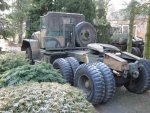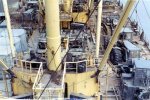Scrambler
Member
- 118
- 0
- 16
- Location
- the Netherlands
Where did all the Vietnam vehicles go? Did they stay in Vietnam or were they shipped back to the USA or Europe?
A friend of mine bought recently en few M52A2s and a M51A2 and a M54A2; they were sold by DRMO/DRMS in Germany about 10 to 15 years ago, all are overhauled in Bublingen, Germany in the early seventies. According to the available paperwork they're built in 1966 but we think it's rather strange that they have to overhaul a 5 year old truck. And the fact that in that time in Europe there were hardly any use for armytrucks. Is it possible that these trucks are Vietnam Veterans?
Is there a way to figure out the excact building dates? All the trucks are repainted in MERDC camouflage but at some places pieces of a white star is visible underneath the camouflage so they have been (dark) green with a white star on the hood and doors.
Except the M54A2 which is white, repainted for the UN of which most were sent to Africa 16 years ago except this one because the engine is broken.
A friend of mine bought recently en few M52A2s and a M51A2 and a M54A2; they were sold by DRMO/DRMS in Germany about 10 to 15 years ago, all are overhauled in Bublingen, Germany in the early seventies. According to the available paperwork they're built in 1966 but we think it's rather strange that they have to overhaul a 5 year old truck. And the fact that in that time in Europe there were hardly any use for armytrucks. Is it possible that these trucks are Vietnam Veterans?
Is there a way to figure out the excact building dates? All the trucks are repainted in MERDC camouflage but at some places pieces of a white star is visible underneath the camouflage so they have been (dark) green with a white star on the hood and doors.
Except the M54A2 which is white, repainted for the UN of which most were sent to Africa 16 years ago except this one because the engine is broken.
Attachments
-
102.4 KB Views: 142





